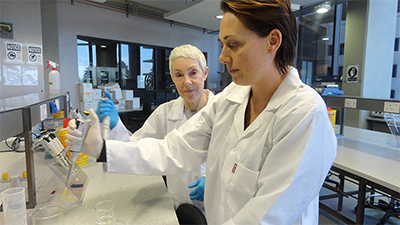News & Events
Study wherever you are…
The College of Agriculture and Environmental Sciences (CAES) previously conducted Life Sciences practicals at the University of Potchefstroom, because Unisa did not have laboratory facilities to accommodate these kinds of practicals.

Diana du Cros (BSc Zoology and Physiology student, from the US) and Joelle Beavis (BSc Biochemistry and Physiology student, from England) at the first Life Sciences practicals conducted at the Unisa Science Campus.
However, starting from 2017, these Life Sciences practicals have, for the first time, come home to the Unisa Science Campus.
The first group of the practicals included two overseas students.
BSc Biochemistry and Physiology student, Joelle Beavis, from England, knew about Unisa because she and her husband had lived in Cape Town and, at that time, her husband studied through Unisa. She said that she had always wanted to study dietetics and Unisa was the only institution which gave her the option of specialising in both Biochemistry and Physiology.
According to her, Unisa is the best place to study, because she can study and, at the same time, take care of the family. “I know that most people attending the practicals are coming from fairly long distances, but when you are coming from overseas, and being a mother, it is a big challenge to organise your life before leaving. This involves not only preparation for the practicals, but also organising the family. I am relying on my husband to take care of the children while I am in South Africa at Unisa for practicals,” said Joelle.
She remarked that she found the practicals very well organised and added that it addressed the gaps that students encountered in the study guides and assisted them in overcoming the challenges associated with distance learning. This was quite remarkable, because they are the first group to have the practicals at the Science Campus. She mentioned that when she arrived at Unisa, she found that the labs were well equipped and well organised. She was impressed with the equipment and thought the labs were first class. She noted that there was always somebody in the labs to assist and she never had the feeling that she was on her own, while stuck in front of a computer.
“For me, as an open distance learning student, you are isolated and away from everybody. The practicals may sound corny, but now that I am here, it is good to see the faces. The students can compare and share information and support one another,” said Joelle.
She mentioned that when you do practicals you realise that this aspect is an important part of the degree, and having this contact is invaluable, instead of looking at a computer screen.
Diana du Cros, a BSc Zoology and Physiology student from the USA, is interested in studying cats from Africa—cheetahs and leopards, to be precise. She mentioned that she always wanted to do a degree and, when she was ready, she started to look for options to do online studies. She discovered that Unisa offers a degree in Zoology and, more importantly, it was an open distance learning university.
“It was the most suitable option for me, because I am working and cannot study full time at a university in the USA. I also saw it as a good opportunity to study these cats in Africa,” said Diana.
She explained that she takes care of many animals that roam on about 10 hectares of land. She, therefore, also had some organising to do before leaving to come to Unisa. This included arranging accommodation and flights, but she also had to make sure that someone is looking after her animals. In this regard, her husband and neighbours have assisted her a great deal by agreeing to take care of the animals during the time that she is here. Because she works, she had to take vacation leave to come to South Africa to do the practicals. Previously, to do her practicals, she travelled three hours to Atlanta, to a Unisa exam-accredited facility.
She commented that she was excited about being here, as they were the first practicals for Zoology and Physiology to take place at Unisa, and not at the University of Potchefstroom. She was also of the view that the practicals had gone very well, adding that the level of instruction was very good and that she found the entire presentation well organised. She mentioned that there was one practical which was a challenge for her, but accepts that this is all part of research challenges—not everything will go well all the time.
She also commented that working in isolation and having no one to speak to, is a different experience to having face-to-face contact and the advantage of this is that you get immediate feedback and this saves time.
She expressed the hope that this would be the last practical for her, even though it had been her first time visiting the Science Campus. And, since it will be her only experience with Unisa, she has been taking a lot of pictures of the labs and the campus, to show her family and friends that Unisa really exists and that she has not been making up stories for the past six years that she has been studying!
*By Poppie Khoza
Publish date: 2017/04/05
